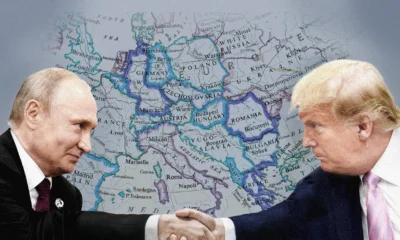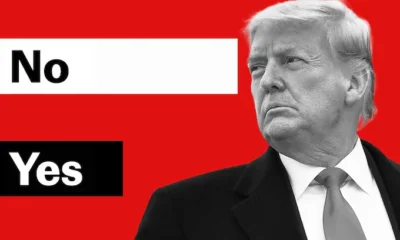Politics
End To Russia-Ukraine War? Russian Economy A Growing Concern For Putin. Has Trump’s Ultimatum Of More Sanctions Put A Speedbreaker On Putin’s Plans?
Published
1 year agoon

When it comes to the Russia-Ukraine war, the world seems to be stuck in a loop of sanctions, threats, and high-stakes diplomacy. But recent developments suggest that the tide may finally be shifting—and not necessarily in Vladimir Putin’s favor.
For two years, Putin’s Russia has defied expectations. Despite being slapped with some of the harshest Western sanctions in modern history, the Russian economy managed to stay afloat. Oil, gas, and mineral exports propped up its $2.2 trillion economy, while officials in Moscow patted themselves on the back for outmaneuvering the West.
But now, cracks are starting to show. Labor shortages are biting hard, inflation is creeping toward double digits, and high interest rates—meant to curb inflation—are making life miserable for businesses and ordinary Russians alike. And let’s not forget the elephant in the room, record military spending. Keeping the war machine running has turbocharged defense budgets but left other parts of the economy gasping for air.
Trump’s Return
Adding to Putin’s headaches is Donald Trump, who just waltzed back into the Oval Office with bold claims about ending the Ukraine conflict. Trump has wasted no time turning up the heat, hinting at more sanctions and tariffs unless Putin gets serious about peace talks. Trump has even warned that Russia is heading for “big trouble” if it doesn’t shift course soon.
The former president’s approach is classic Trump: mix a bit of carrot with a whole lot of stick. According to White House spokesperson Brian Hughes, Trump is “focused on ending this brutal war” and has been consulting with a wide range of policymakers to find a resolution. Of course, Trump being Trump, he initially claimed he could end the war in a single day. His advisers have since walked that back, but the message remains clear – pressure is mounting on Russia to come to the negotiating table.
Kremlin Rumblings
Behind the scenes, there’s growing unease in Moscow. Multiple sources with knowledge of Kremlin dynamics say some members of Russia’s elite are warming up to the idea of a negotiated settlement. The reason? The economy can’t keep taking hits like this.
Former Central Bank of Russia deputy chairman Oleg Vyugin put it bluntly: “Russia is economically interested in negotiating a diplomatic end to the conflict.” Vyugin isn’t alone in this sentiment, although the Kremlin remains tight-lipped about its internal debates.
Still, any potential peace deal comes with strings attached. Russia wants its territorial gains in Ukraine recognized and Ukraine’s NATO ambitions dropped—a tall order for Kyiv and its Western allies.

Can Putin Hold Out?
Despite the growing challenges, Putin remains defiant. At his annual press conference in December, he acknowledged the economy’s struggles but expressed confidence in his government’s ability to steady the ship. “There are some issues here, namely inflation, a certain overheating of the economy,” he said, before adding that the central bank and government are already working to “bring the tempo down.”
But even Putin can’t ignore the numbers. The IMF predicts Russia’s GDP growth will slip below 1.5% this year—a sharp contrast to its vigorous performance in 2023 and 2024. Inflation is rising, and the central bank has hiked interest rates to a whopping 21%.
Putin’s Calculated Strategy
Russia’s war in Ukraine has reached a critical juncture. With nearly a fifth of Ukraine under its control, Russia has achieved its most significant territorial gains since the conflict began.
Putin believes that Russia’s primary objectives in the war have already been achieved. The land corridor connecting mainland Russia to Crimea is firmly under Russian control—a strategic lifeline Putin had long sought. Moreover, Ukraine’s military has been significantly weakened, according to Kremlin insiders.
These milestones, however, come at a steep cost. Russia has pushed its defense spending to a post-Soviet high, allocating a staggering 6.3% of GDP to military expenditures this year. This accounts for nearly a third of the national budget, putting immense pressure on other sectors of the economy.
Beneath the Surface
The war has triggered a domino effect on Russia’s economy. Inflationary pressures, driven by skyrocketing defense spending and labor shortages, are taking a toll. Wages are rising as a result, but so are interest rates, making borrowing expensive for businesses and individuals alike.
To add to the burden, the government has increased taxes to bridge its fiscal deficit, further squeezing businesses. Coal and steel producer Mechel, owned by Igor Zyuzin, recently had to restructure its debt due to low coal prices and exorbitant interest rates—a reminder of the challenges facing Russia’s industrial sector.
Putin’s Growing Concerns
Hence, Putin’s unease with the economic situation has become increasingly evident. During a closed-door meeting with business leaders in December, he expressed frustration over declining private investment, which has been stifled by the high cost of credit.
According to insiders, Putin was visibly displeased, especially after hearing reports that high interest rates were deterring long-term investments critical for economic stability. Central Bank Governor Elvira Nabiullina, a key figure in monetary policy, was notably absent from this meeting, raising eyebrows about internal dynamics within the Kremlin.
Putin later publicly acknowledged the issue, calling for a “balanced rate decision.” However, the central bank chose to maintain the interest rate at 21% during its final monetary policy meeting of the year, defying market expectations of a hike. Governor Nabiullina defended the decision, stating that criticism of central bank policy is inevitable when rates are high.
Rising Tensions Among Russia’s Elite
The economic strain has not gone unnoticed by Russia’s powerful business leaders. Prominent figures like Rosneft CEO Igor Sechin, Rostec CEO Sergei Chemezov, and aluminum tycoon Oleg Deripaska have openly criticized the central bank’s policies. Even heavyweights like Sberbank CEO German Gref and VTB CEO Andrei Kostin have voiced concerns about the risks of stagflation—a toxic mix of stagnant growth and high inflation.
The growing dissatisfaction among Russia’s elite illustrates the precarious balancing act Putin must perform. On one hand, he needs to maintain military momentum and uphold his war goals. On the other, he must address the economic fallout to prevent further erosion of domestic support.
The Steady Hand Steering Russia’s Economy
Elvira Nabiullina, a key figure in Russia’s economic machinery, has become both a trusted ally of President Vladimir Putin and a lightning rod for criticism amid the economic fallout of the Ukraine war. As the central bank governor since 2013, Nabiullina’s influence on Russia’s financial stability is immense, even as the country faces inflation, sanctions, and wartime spending.
To put it straight, Nabiullina isn’t just another technocrat; she’s one of Russia’s most powerful women and a seasoned economic strategist. Having served as Putin’s economy minister before taking the helm at the central bank, she has long been a trusted member of his inner circle.
Her critical role became even more apparent in 2022, mere weeks after Russia’s military crossed into Ukraine. Amid global sanctions and economic upheaval, Putin offered her a third term as central bank governor, a testament to his faith in her leadership. Her current term runs until 2027, and insiders say she’s unlikely to be replaced anytime soon.
“No one in such a situation will change the governor of the central bank,” said a source familiar with discussions in the Kremlin. “Nabiullina’s authority is indisputable; the president trusts her.”
Still, despite her reputation, Nabiullina hasn’t escaped criticism. Some lawmakers have called for her ousting, frustrated by soaring interest rates and inflation. However, her supporters argue that these challenges stem from the government’s massive war expenditures rather than central bank policy.
“She’s the glue holding economic stability together,” one insider remarked. Critics, they say, overlook the broader picture: without her steady hand, the financial landscape could have spiraled out of control under the weight of sanctions and wartime pressures.
Wartime Economy
As central bank governor, Nabiullina has faced extraordinary challenges. She has had to manage an economy strained by record military spending, a 21% benchmark interest rate, and mounting inflation. Her policies, while contentious, have been aimed at preventing the economy from overheating while ensuring Russia’s financial system remains functional.
Her approach has earned her both praise and pushback. While some business leaders criticize high interest rates for stifling private investment, others acknowledge that Nabiullina’s decisions are crucial for maintaining long-term economic stability.
What Will Russia Ultimately Do?
While Putin has achieved significant military and territorial objectives, the economic toll of the war is becoming increasingly hard to ignore. High interest rates, inflation, and fiscal pressures are testing the resilience of Russia’s economy and its business sector.
The question now is whether Putin can sustain this balancing act or whether the economic strain will force a shift in strategy. For now, the Kremlin seems committed to its military goals, but the mounting pressure from within—both economically and politically—suggests that the decision will be critical, the longer the Russia-Ukraine war drags on the more Russia’s economy will suffer.
For Trump, his promise to end the war will test his ability to deliver on foreign policy—a realm where his track record is, let’s say, mixed.
You may like
-


How It’s Not Trump But Vladimir Putin That Europe Is Stinging From: Trump’s U-Turn On Europe, Russia’s Strong Supply Chain—A Formidable Opponent!
-


Trump Blames Zelenskyy For Russia-Ukraine War As Peace Talks Sideline Kyiv. EU $6.2 Billion Military Aid Package For Ukraine—What’s The Real Plan?
-


Trump’s Commendable Proposal. A Summit With Putin And Xi Jinping To Halve Military Budgets—Arms Reduction, Can It Happen?
-


Will Ukraine Get A Raw Deal Despite 3 Years Of War? Trump-Putin Alliance Puts Zelenskyy In A Corner, While Europe Senses Trouble—Can Europe Stop This?
-


Does Trump Really Want The Russia-Ukraine War To End? Or Eying A Business Deal, Following ‘Want Ukraine To Give Precious Minerals’ In Return For US Aid? Mineral Wars And What Will Kyiv Do Now?
-


The ‘Hidden’ Story Of Europe’s Undersea Cables. Natural Causes Or Sabotage? Estonian Minister Proposes Baltic Sea Shipping Tax To Fund Undersea Cable Protection

